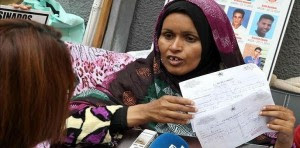Polisario Confidential
by Khalid Ibrahim Khaled
The Polisario has been traumatized by the Spanish authorities’ decision to put an end to the sit-in observed by Takbar Haddi in front of Morocco’s consulate in the Canary Islands, according to informed sources in Tindouf camps. The Polisario leaders sensed that the decision actually reflects Madrid’s will to end the complacency regarding pro-Polisario activities.
It all started with the Polisario’s alacrity to instrumentalize the case of Takbar Haddi. The son of this Sahrawi women, Lamine Haidalah, died in Laayoune in February, in a brawl with young people from the city where he was known for his chronic delinquency.
The trial of the individuals involved in the murder was ongoing in Morocco, but the Algeria-backed Sahrawi Front preferred to displace the case to Las Palmas, where it has pockets of supporters.
The Polisario activists enticed the bereaved mother to hold a sit-in in front of the Moroccan consulate to denounce Morocco for alleged human rights abuses. However after a month and a half, Spanish authorities got weary of the maneuver and decided to dislodge the protester.
Madrid authorities that are used to the Polisario activism in Spain, where the Separatist front has various accomplices, have decided to change tactics this time.
This new attitude on the part of Madrid has, however, worried the Polisario, which claims the independence of Western Sahara, especially as the firmness shown by Spanish authorities concerning the sit-in of Takbar Haddi is not an isolated attitude.
The firm decision actually took place in the wake of the latest report of the prestigious Royal Institute El Cano. The report, worked out over the last months of April and May and released in mid-June, shows that the Spanish public opinion is increasingly indifferent to the Western Sahara issue.
Between 2005 and 2015, the percentage of Spaniards backing the Polisario’s separatist claims fell from 72% to 58%. Meanwhile, the number of Spaniards supporting the autonomy of the territory under Moroccan sovereignty remained stable at 16% during the same period.
The trend worries not only the Polisario leaders, but also Algeria, the main political, military and financial supporter of the Sahrawi separatist front.




